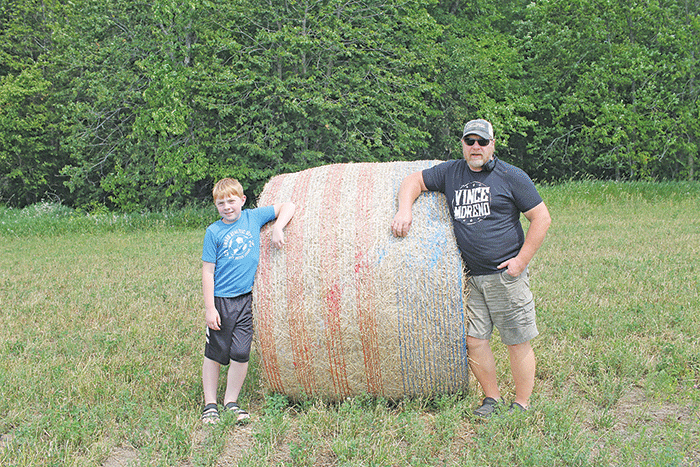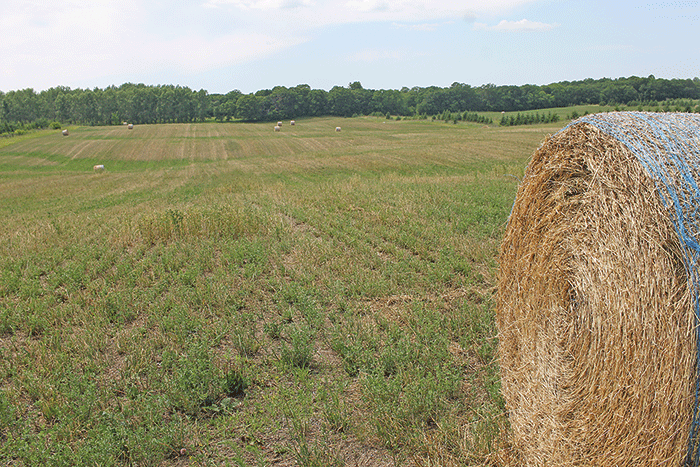Hay producer concerned for farmers
News | Published on July 12, 2021 at 6:32pm EDT | Author: Chad Koenen
0
Above: DuWayne Ditterich and his 10-year-old son Boone stand next to a freshly wrapped 800 pound bale of hay. Last year the bales were about 1,200 pounds. Below: In one of his fields, Last year DuWayne Ditterich baled about 155 bales of hay with each weighing 1,200 pounds. This year, in June on the same field, there were 40 bales weighing 800 pounds each.
Hay crop may force some ranchers out of business
By Barbie Porter
Editor
uWayne Ditterich put his hay customers on notice, they need to begin searching for someone to supply them with hay. Driving out to one of his hay fields in rural Vergas, Ditterich explained last year he had about 2,700 bales on about 600 acres. “That was a good year,” he emphasized. “This year, on 400 acres, I’d be happy if I get 400 bales that are 800 pounds.” Normally, he sells about 1,700 bales of hay to ranchers, farmers and horse owners. The conditions, from the little snow pack to the cold spring and dry summer months, have left Ditterich hoping he has enough hay for his own animals. “The cold early on slowed the growing,” he said. “Then it’s been so dry the hay loses all of its feed value; it even dries to the point it falls through the belts and doesn’t wrap. This year we will abandon a lot of it; it’s just not worth cutting.”
Even with the recent rain, he said it is likely too little, too late for many hay fields. He noted, from historic dry levels experienced today, a person would need to go back 132 years, including the “dirty 30s.”
Transporting hay from a state that has had their rain gauges filled is an option. The maximum a trailer hauls is 34 bales weighing 1,000 pounds, Ditterich said. Ten bales is estimated per animal per year. Ditterich explained transporting hay more than 100 miles is often more expensive than the value of the hay.
“So, Iowa or Missouri might have a decent hay crop, but they have their own cattle to feed and farmers to sell to,” he said. “For many, bringing in hay from that distance isn’t financially feasible.”
Hay is also the only crop that provides all a cow needs without any additional supplements, said Ditterich. With some shady people out looking to make a fast buck, he is worried some farmers might end up buying road ditch hay.
“It’s not quality hay, and it could have an aluminum can in there,” he said. “A cow eats that and you lose the cow.”
The United States Department of Agriculture does have a hay hotline for emergencies, and it is considered a last resort. The Counties of Becker and Otter Tail are eligible for emergency haying and/or grazing of CPR land, according to a post on the USDA website as of July 8, 2021.
Before haying or grazing, one must contact the FSA county office to ensure the county is still eligible and/or to obtain a modified conservation plan.
The FSA contact in Becker county is Crystal Dibley, (218) 847-9392 ext. 2
Julie Welter is the FSA contact for Otter Tail county and can be reached at (218) 346-4260 ext. 2.
Ditterich supplies hay for between 20 and 49 cow operations. With no hay, some farms may go out of business.
“In February, a good heifer sold for $1,800,” he said. Now, a heifer and a calf is going for $1,300. They aren’t going broke, there is just no feed.”
The sudden increase in supply doesn’t mean the consumer will see a drop in prices.
“I don’t think the consumer will see a price break,” he said. “I think we’ll just see the farmer get screwed.”
He said the next chance for a farmer to recoup losses will be in late winter or spring of 2022. Then, there will be less calves and cows brought to market. When that happens, the consumer may see price increases.
Ditterich moved back to the area in 2006. He started raising crops in 2007 and cattle in 2013. He has 40 cows in his pasture and another 40-to-60 on his feed lot. In 2017 he started selling his meat at a store on his property.
When the pandemic arrived, Ditterich said he noticed a shift in his customer’s buying habits. Suddenly bulk was back.
“I thought it would pass as life got back to normal, but people are still buying in bulk,” he said. “For families that can afford it, you get substantial savings.”
Ditterich Family Farm is also now supplying three restaurants with choice cuts.
“I sell to Blackboard in Vergas, The Burger Shack and Shakes in Ottertail and Stalker Lake Golf Course in Dalton,” he said.


